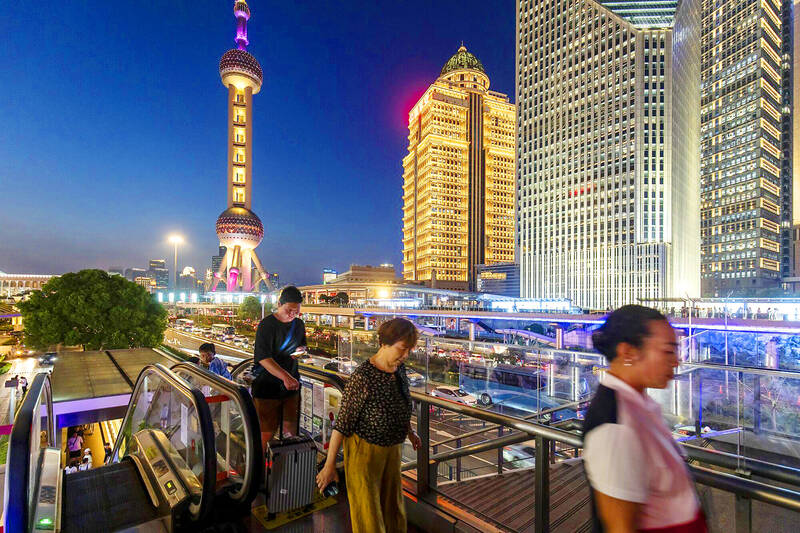Foreign investors pulled a record amount of money from China last quarter, likely reflecting deep pessimism about the world’s second-largest economy.
China’s direct investment liabilities in its balance of payments dropped almost US$15 billion in the April-to-June period, marking only the second time this figure has turned negative, data from the Chinese State Administration of Foreign Exchange (SAFE) released on Friday showed. It was down about US$5 billion for the first six months.
Should the decline continue for the rest of the year, it would be the first annual net outflow since at least 1990, when comparable data began.

Photo: Bloomberg
Foreign investment into China has slumped in recent years after hitting a record US$344 billion in 2021. The slowdown in the economy and rising geopolitical tensions have led some companies to reduce their exposure, and the rapid shift to electric vehicles in China also caught foreign auto firms off guard, prompting some to withdraw or scale back their investments.
The fall comes despite Beijing’s growing efforts to attract and retain foreign investment, following the smallest increase on record last year.
SAFE’s data, which track net flows, can reflect trends in foreign company profits, as well as changes in the size of their operations in China. Multinationals have more reason to keep cash abroad rather than in China, as advanced economies have been raising interest rates while Beijing is lowering them to stimulate the economy.
Earlier figures from the Chinese Ministry of Commerce showed that new foreign direct investment in the first half of the year was the lowest since the start of the COVID-19 pandemic in 2020.
Chinese outbound investment also hit a record, with firms sending US$71 billion overseas in the second quarter, up more than 80 percent from the US$39 billion in the same period last year, SAFE’s data showed.
Chinese firms have been rapidly stepping up investment, with money going into projects such as electric vehicle and battery factories.
The data also showed that the anomaly in the measurement of China’s trade surplus continues to grow, hitting a record US$87 billion in the second quarter and taking it to almost US$150 billion for the first half of the year. That gap was highlighted by the US Department of the Treasury earlier this year in a report that called on China to clarify why the numbers were so different.
According to a recent report from the IMF, this discrepancy “seems to be mainly caused by the different methodologies used to record exports and imports of goods.”
The gap has grown after a switch two years ago in what data the Chinese authorities were using, and was also boosted by a recent increase in production in bonded zones by foreign firms.

The US dollar was trading at NT$29.7 at 10am today on the Taipei Foreign Exchange, as the New Taiwan dollar gained NT$1.364 from the previous close last week. The NT dollar continued to rise today, after surging 3.07 percent on Friday. After opening at NT$30.91, the NT dollar gained more than NT$1 in just 15 minutes, briefly passing the NT$30 mark. Before the US Department of the Treasury's semi-annual currency report came out, expectations that the NT dollar would keep rising were already building. The NT dollar on Friday closed at NT$31.064, up by NT$0.953 — a 3.07 percent single-day gain. Today,

‘SHORT TERM’: The local currency would likely remain strong in the near term, driven by anticipated US trade pressure, capital inflows and expectations of a US Fed rate cut The US dollar is expected to fall below NT$30 in the near term, as traders anticipate increased pressure from Washington for Taiwan to allow the New Taiwan dollar to appreciate, Cathay United Bank (國泰世華銀行) chief economist Lin Chi-chao (林啟超) said. Following a sharp drop in the greenback against the NT dollar on Friday, Lin told the Central News Agency that the local currency is likely to remain strong in the short term, driven in part by market psychology surrounding anticipated US policy pressure. On Friday, the US dollar fell NT$0.953, or 3.07 percent, closing at NT$31.064 — its lowest level since Jan.

The New Taiwan dollar and Taiwanese stocks surged on signs that trade tensions between the world’s top two economies might start easing and as US tech earnings boosted the outlook of the nation’s semiconductor exports. The NT dollar strengthened as much as 3.8 percent versus the US dollar to 30.815, the biggest intraday gain since January 2011, closing at NT$31.064. The benchmark TAIEX jumped 2.73 percent to outperform the region’s equity gauges. Outlook for global trade improved after China said it is assessing possible trade talks with the US, providing a boost for the nation’s currency and shares. As the NT dollar

The Financial Supervisory Commission (FSC) yesterday met with some of the nation’s largest insurance companies as a skyrocketing New Taiwan dollar piles pressure on their hundreds of billions of dollars in US bond investments. The commission has asked some life insurance firms, among the biggest Asian holders of US debt, to discuss how the rapidly strengthening NT dollar has impacted their operations, people familiar with the matter said. The meeting took place as the NT dollar jumped as much as 5 percent yesterday, its biggest intraday gain in more than three decades. The local currency surged as exporters rushed to